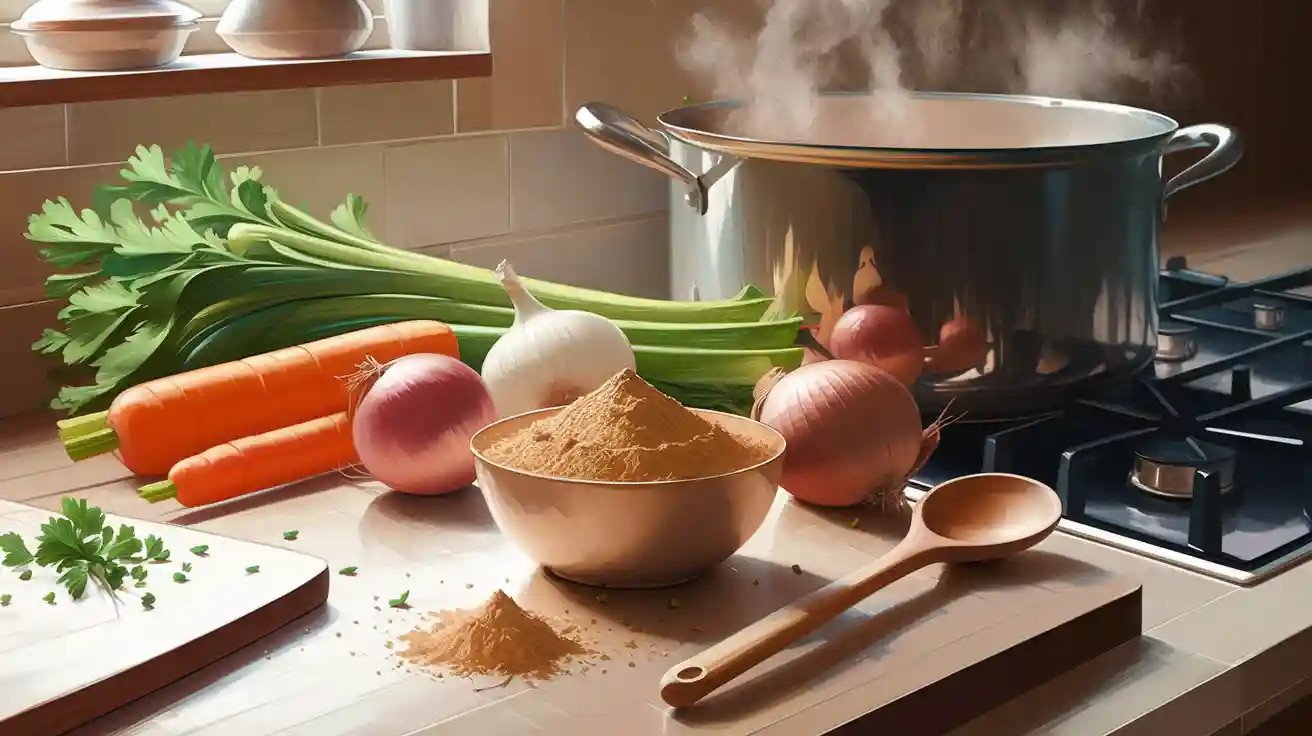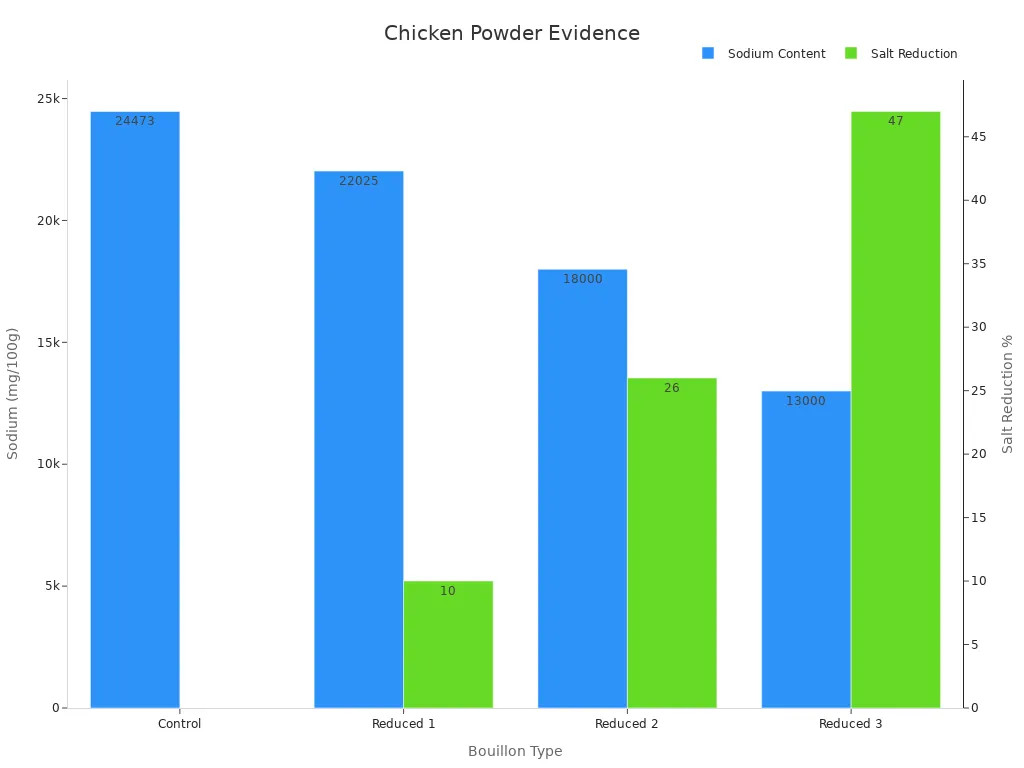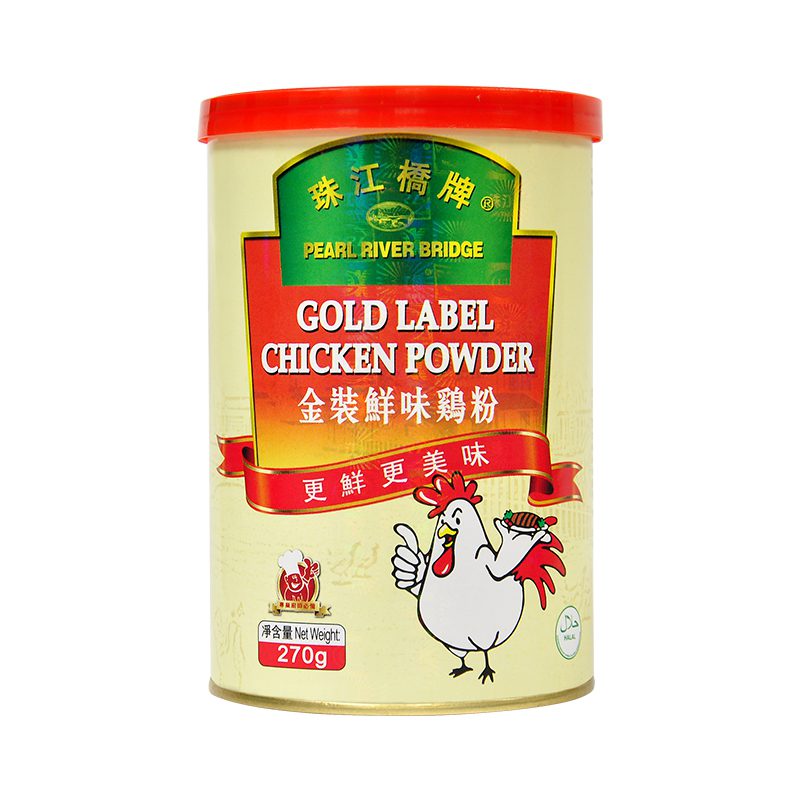
Chicken powder makes food taste rich and delicious. It is made from dried chicken broth mixed with spices and seasonings. It helps you cook faster and makes meals better. Many people use it because it works in many recipes. By 2030, its market is expected to grow by 5.2% each year.
What Is Chicken Powder?
Definition and Key Ingredients
Chicken powder is a seasoning that adds a chicken-like taste to food. It is made by drying chicken broth and mixing it with other ingredients. This creates a fine powder that dissolves in liquids or blends into dry recipes.
Here are the main ingredients often found in chicken powder:
-
Dried chicken broth or chicken extract
-
Monosodium glutamate (MSG) to boost savory flavors
-
Salt and sugar for balanced taste
-
Spices like garlic, onion, or pepper for extra flavor
-
Maltodextrin to improve texture and thickness
-
Chicken fat for a richer flavor
-
Yeast extract, disodium inosinate, and disodium guanylate for stronger taste
Tip: MSG in chicken powder makes it taste more savory. Use it to create bold and tasty dishes.
These ingredients make chicken powder flavorful and useful for many recipes.
How It Differs from Chicken Bouillon and Stock
Chicken powder, bouillon, and stock may seem alike but are used differently. Knowing their differences helps you pick the right one for your dish.
|
Feature |
Chicken Powder |
Chicken Bouillon |
Chicken Stock |
|---|---|---|---|
|
Form |
Powder or granules |
Cubes or small granules |
Liquid |
|
Preparation |
Made from dried chicken broth |
Compressed chicken flavor with salt |
Made by simmering chicken and veggies |
|
Flavor Intensity |
Very strong and adjustable |
Strong but less flexible |
Mild and natural |
|
Convenience |
Easy to dissolve and store |
Simple to use but less versatile |
Needs time to prepare and refrigerate |
Chicken powder is easy to use and very flexible. Unlike bouillon, you can adjust its flavor strength. Compared to stock, it saves time but still tastes great. Use it for soups, marinades, or quick meals—it works for almost anything!
Benefits of Using Chicken Powder in Cooking
Boosts Savory and Meaty Flavors
Chicken powder makes food taste more savory and rich. It adds a "meaty" flavor to soups, sauces, and marinades. Monosodium glutamate (MSG) helps make meals even tastier. You can use chicken powder instead of extra spices or seasonings. Add it to stews or noodle dishes for bold flavors. Every bite will be full of delicious taste.
Easy and Saves Time
Chicken powder helps you cook faster and easier. You don’t need to simmer stock or marinate for hours. Studies show it saves time in the kitchen:
-
Pre-seasoned chicken cubes are quick to use.
-
They give the same flavor to every dish.
-
You don’t need extra steps to prepare meals.
Chicken powder is great for busy cooks. Mix it with water for broth or sprinkle it on food. It keeps meals tasty while saving time.
Works with Many Cuisines
Chicken powder fits into many types of cooking styles. It works well in Chinese, Italian, and Mexican recipes. Use it for hot pot broth or creamy pasta sauce. It also improves vegetarian dishes like dips and veggie soups. Chicken powder lets you try new flavors and improve old recipes.
Practical Uses of Chicken Powder
As a Stock or Broth Replacement
Chicken powder is a fast replacement for stock or broth. Homemade stock takes hours to make, but chicken powder dissolves quickly in water. It gives a rich and savory flavor to your meals. This makes it perfect for busy cooks who need quick solutions.
You can control the flavor strength by adjusting the amount used. Use less for a mild taste or more for a stronger flavor. This flexibility makes chicken powder great for soups, stews, and gravies. It offers the depth of homemade stock with added convenience, making it a kitchen favorite.
In Soups, Stews, and Sauces
Chicken powder boosts the savory taste in soups, stews, and sauces. It mixes well with other spices, creating a balanced flavor. Studies show that umami-rich chicken soup can improve appetite and nutrient absorption. It may also help reduce inflammation and ease cold symptoms, making it both tasty and comforting.
Here’s a table comparing sodium levels in different bouillons. It shows how chicken powder keeps flavor while lowering salt:
|
Bouillon Type |
Sodium (mg/100g) |
Salt Cut (%) |
Liked by Consumers |
|---|---|---|---|
|
Regular |
24,473 |
0 |
High |
|
Reduced 1 |
22,025 |
10 |
High |
|
Reduced 2 |
18,000 |
26 |
High |
|
Reduced 3 |
13,000 |
47 |
High |

Using chicken powder balances flavor and health, making it a smart choice for cooking.
In Rice, Noodles, and Marinades
Chicken powder makes rice, noodles, and marinades taste better. Add a teaspoon to rice water for a subtle flavor boost. Sprinkle it into noodle broth or sauce for a richer taste.
In marinades, chicken powder enhances the flavor of meats. Mix it with garlic, onion, and pepper for a tasty marinade. It works well in many cuisines, like Chinese stir-fried noodles or Italian risottos.
In Dips, Spreads, and Vegetarian Meals
Chicken powder isn’t just for meat dishes. It improves vegetarian recipes too. Add a pinch to dips like hummus or guacamole for extra flavor. It blends well with other seasonings for a balanced taste.
For vegetarian soups and stews, chicken powder adds umami flavor. It also works in roasted vegetable dishes, enhancing their natural sweetness. Its versatility makes it a must-have for all types of cooking.
Comparing Chicken Powder to Alternatives
Chicken Powder vs. Chicken Bouillon
Chicken powder and bouillon cubes are similar but not the same. Bouillon cubes are compact and salty, while chicken powder is fine and dissolves quickly. Bouillon has a fixed flavor, but chicken powder lets you adjust taste by using more or less.
Some bouillon brands have unwanted additives, making chicken powder a cleaner choice. Homemade stocks and broths are healthier but take time to prepare. Chicken powder is a quick and easy option for busy days.
Tip: Add chicken powder to soups or stews for fast, tasty meals without losing quality.
Chicken Powder vs. Chicken Essence
Chicken powder and chicken essence are made differently and used for different purposes. Chicken essence is heated and filtered to create a clear, nutrient-rich liquid. Chicken powder has dried chicken and small particles, making it better for dry recipes.
|
Aspect |
Chicken Essence |
Chicken Powder |
|---|---|---|
|
Pasteurization |
Heated to remove harmful bacteria |
Usually not pasteurized |
|
Filtration |
Filtered for a clear liquid |
May include small particles |
|
Ingredients |
Made from chicken, water, and seasonings |
Includes dried chicken and spices |
|
Nutritional Value |
High in vitamins and minerals |
Varies by brand |
Chicken essence is great for nutrition, while chicken powder works in many recipes. Both add flavor, but chicken powder’s spices make it more useful for everyday cooking.
Chicken Powder vs. Homemade Stock
Homemade stock tastes fresh and mild but takes time to make. Chicken powder is faster and adds a rich, savory flavor without hours of cooking. Bone broth, a type of stock, is more nutritious than chicken powder or bouillon.
Store-bought concentrates are like bouillon but lack homemade stock’s depth. Chicken powder is a good middle ground, offering strong flavor and convenience. For busy cooks, it’s a handy substitute. Add fresh spices to make it taste closer to homemade stock.
Nutritional Considerations and Potential Downsides
Nutritional Value of Chicken Powder
Chicken powder is an easy way to make meals tastier. It also adds some protein, which helps muscles stay strong. The amount of protein depends on the brand you use.
Here’s a table showing how protein levels affect body fat:
|
Study |
Protein Level |
Effect on Body Fat |
|---|---|---|
|
Kassim and Suwanpradit |
23% to 20% CP |
More belly fat |
|
Collin et al. |
Low-protein vs Normal |
More belly fat |
|
Yalçin et al. |
19.2%, 16.6%, 15.5% |
More total body fat |
|
Yalçin et al. |
26.6%, 23.5%, 20.7% |
Less total body fat |
|
Jlali et al. |
17% to 23% CP |
Less belly fat |
This table shows higher protein can lower body fat. Picking chicken powder with more protein can help you eat healthier without losing flavor.
Sodium Content and Health Implications
Chicken powder has sodium, which makes food taste better. Sodium is important for your body but too much is harmful. Eating too much sodium can cause high blood pressure. For example, turkey bacon has over 2000 mg of sodium per 100 g. Fresh chicken has less than 100 mg.
Bouillon and store-bought broths also have lots of sodium. Chicken powder is a tasty option, but watch your sodium intake. Too much sodium can lead to heart problems or strokes. Use it carefully to stay healthy.
Moderation and Sensitivity Awareness
Using chicken powder in small amounts is the best choice. This way, you avoid too much sodium or other additives. If you’re sensitive to MSG or certain spices, check the label first. Some people may feel mild side effects from these ingredients. Start with a little and adjust as needed.
Mixing chicken powder with fresh foods keeps meals healthy and flavorful. Watch your portion sizes and ingredient sensitivities. This lets you enjoy chicken powder’s taste without risking your health.
Tips for Choosing and Storing Chicken Powder
Recommended Brands
Pick chicken powder from brands with good quality. Choose products made with natural chicken extract. Avoid powders with unnecessary additives. Look for clear ingredient lists and food safety certifications. Trusted spices and seasonings brands offer better flavor and health benefits. These brands help make your dishes tasty and safe.
Proper Storage Techniques
Store chicken powder properly to keep it fresh longer. Use airtight containers to stop moisture from causing clumps or spoilage. Keep it in a cool, dry place away from sunlight. If the package is resealable, close it tightly after each use. For long storage, use UV-resistant containers to protect its quality.
Do Seasonings Expire?
Yes, seasonings can expire. The expiration of seasonings depends on storage and packaging. Old chicken powder may lose its smell, taste, and strength. Watch for these signs that your seasonings have expired:
-
Clumps or faded color
-
Weak smell or stale aroma
-
Less flavor when cooking
Good packaging helps seasonings last longer.
|
Evidence Description |
Impact on Food Safety and Shelf Life |
|---|---|
|
Airtight packaging stops moisture |
Prevents clumps, spoilage, and germs |
|
Secure seals stop oxidation |
Keeps flavor fresh |
|
UV-resistant containers block light |
Protects ingredients from damage |
|
Tight sealing keeps aroma inside |
Maintains seasoning's appeal |
Follow these tips to keep your chicken powder fresh and flavorful.
Chicken powder makes cooking easier and tastier. It adds strong flavors and helps you cook faster. You can use it in many recipes to improve old dishes or try new ones.

Pro Tip: Try chicken powder in various cuisines. It can bring new and exciting flavors to your meals.